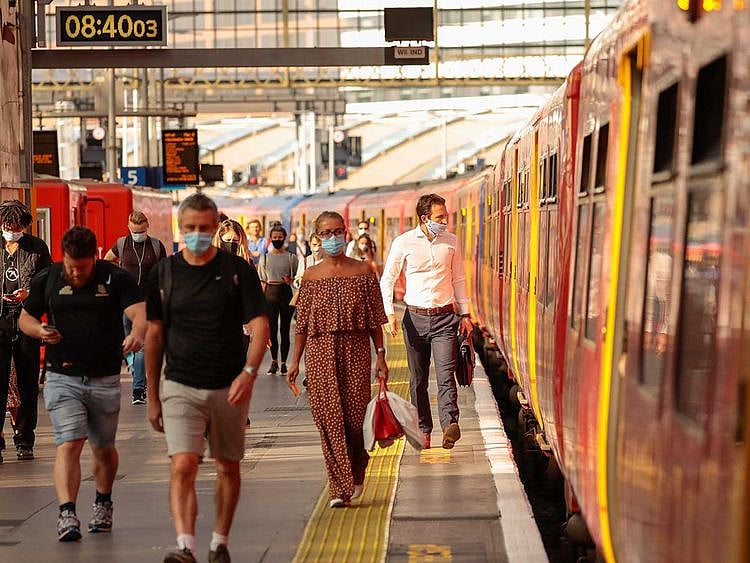UK to launch two new 90-minute COVID-19 tests
Country prepares for winter resurgence as officials warn restrictions could return

London: Boris Johnson’s government signed deals for quick-turnaround tests for COVID-19 as the UK prepares for a winter resurgence of the disease, with officials warning that lockdown restrictions could return.
Amid criticism that its initial response to the crisis was too slow, the government said millions of the tests, which can give results in 90 minutes and check for flu and other viruses, will be sent to hospitals and care homes.
Also Read
Gisburne Park Pop-Up: UK's first purpose built socially-distanced outdoor festivalPhotos: Ukraine's hospitals under strain, even with few COVID-19 casesIn pictures: Look, Black Live Matter protesters demolish slave trader statue in EnglandUkraine's snail farmers fear collapse over EU lockdowns“The fact these tests can detect flu as well as COVID-19 will be hugely beneficial as we head into winter, so patients can follow the right advice to protect themselves and others,” Health Secretary Matt Hancock said in an emailed statement Monday. The tests will help “break chains of transmission quickly,” he said.
Johnson’s government, which has been criticised for locking down too slowly at the start of the UK outbreak, is making preparations for flare-ups in the fall and winter. Ministers have been reviewing possible responses and The Sunday Times newspaper reported they war-gamed sealing off London from the rest of the country in a meeting last week.
Oxford Nanopore Technologies said its initial order from the government is for 450,000 of its LamPORE tests, which use DNA and RNA sequencing to detect the virus. There is potential to scale up to millions of tests per month, the company said in a statement.
DnaNudge said it will provide 5.8 million tests along with processing equipment in a deal worth about 161 million pounds ($211 million). The technology allows doctors and nurses to quickly determine whether patients are infected in emergency settings and before undergoing surgery, cancer care and other procedures, the company said.
Opening up economy
Even as the government braces for an uptick in the virus, it’s trying to open up the economy. On Monday, Chancellor of the Exchequer Rishi Sunak’s “Eat Out to Help Out” programme gets underway, giving diners a discount of as much as 10 pounds ($13) off their restaurant meals. And from Aug. 1, employers have been given more discretion to bring workers back to their workplaces, a change from guidance that people should work from home if possible.
Separately, a report published Monday by the Institute for Government and the Chartered Institute for Public Finance and Accountancy said cuts to budgets since Johnson’s Conservatives came to power in 2010 meant vital services were understaffed and poorly equipped when the virus hit the UK in February. Ministers had failed to learn the lessons of pandemic simulation exercises, it said.
“Greater investment in staff, buildings and equipment would have left services far better placed to respond to coronavirus,” Nick Davies, programme director at the IFG said in a statement. “The government must learn from these mistakes, reflect on where public services are least resilient, and ensure key services are better prepared for either a second wave of coronavirus or any future pandemic.”
‘Major incident’
Ministers are seeking to damp down spikes of the virus while rebooting the economy, which is facing its worst recession in 300 years. Local Government Secretary Robert Jenrick denied newspaper reports that the government plans to close pubs and said curbs on the movements of everyone over the age of 50 is “not something being actively considered.”
The reports came days after Johnson reintroduced restrictions in northwest England and postponed the planned easing of nationwide lockdown measures. On Sunday evening, emergency and public services organisations in Greater Manchester declared a “major incident” to improve their response to a surge in infections.
Former Chancellor of the Exchequer Sajid Javid said the government should make it clear that Asian communities in the northwest are at the centre of the renewed outbreak in the area.
“British Asians - a diverse group - are more likely to work in frontline jobs and live in larger multi generational households,” he said on Twitter. “These factors put them at risk. Let’s be honest about it to protect the most vulnerable.”
Range of Options
Possible measures if infection rates spike elsewhere include locking down the capital and tightening quarantine rules on those flying into the UK, the Sunday Telegraph reported. There could be travel curbs in and out of the M25 highway encircling Greater London and a ban on overnight stays if there’s a surge in cases, the Sunday Times said.
Johnson’s office said the reports were “speculation” but Jenrick said it is right for ministers to keep responses to all possible scenarios under review.
“You’d expect the government to be considering the range of all the options,” Jenrick, who said he wasn’t aware of the plan to seal off London, told Times Radio on Sunday. “We don’t want to do anything that’s a blanket approach across the country; our strategy is to manage this in a localized way with targeted action.”
Sign up for the Daily Briefing
Get the latest news and updates straight to your inbox
Network Links
GN StoreDownload our app
© Al Nisr Publishing LLC 2026. All rights reserved.